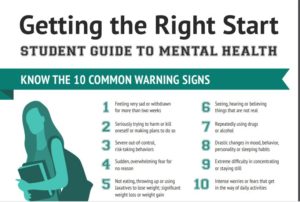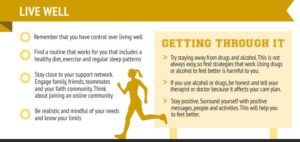October happens to be National Depression Awareness Month. Depression is often thought of as an adult illness and not always recognized when it affects children. However, depression does occur fairly often in young people and can manifest itself in ways which inhibit their ability to enjoy life. About one in five teens will experience depression at some point. The National Institute of Mental Health (NIMH) estimates that approximately 11 percent of adolescents have a depressive disorder by age 18. Recognizing the symptoms is the first step in helping a depressed child or adolescent.
 When dealing with concerns of depression, it is important to create a network of support among family, friends, and health-care providers. Self-care behaviors are a vital part of treatment, including healthy eating and sleeping patterns, increasing physical activity, socializing with others, and personal hygiene. Symptoms of depression among teens can develop from various triggers, such as issues of bullying, excessive use of technology, low physical activity, and experimental substance use. There is a positive impact from educating children and adolescents on how to implement mindfulness exercises and grounding techniques in order to gain more control of their emotions. Mindfulness coping skills bring awareness to at least one of the five senses of the body and tends to help balance both sides of the brain.
When dealing with concerns of depression, it is important to create a network of support among family, friends, and health-care providers. Self-care behaviors are a vital part of treatment, including healthy eating and sleeping patterns, increasing physical activity, socializing with others, and personal hygiene. Symptoms of depression among teens can develop from various triggers, such as issues of bullying, excessive use of technology, low physical activity, and experimental substance use. There is a positive impact from educating children and adolescents on how to implement mindfulness exercises and grounding techniques in order to gain more control of their emotions. Mindfulness coping skills bring awareness to at least one of the five senses of the body and tends to help balance both sides of the brain.
The right side of the brain is the creative and emotional side that is responsible for tasks like intuition, art, music, and imagination. The left side of the brain is responsible for logical thought, language, science and math, reasoning, etc. When children become overemotional they are often using too much of the right side of our brain and therefore do not tend to make logical and healthy decisions. Utilizing coping skills that activate our senses helps to slow down the body, balance the brain, and gain more control of our emotions.
Trained counselors can help clients elevate their moods by utilizing mindfulness skills, including progressive muscle relaxation, deep breathing, and positive imagery. In addition, children also have benefitted from the arts. An example may be to mindfully listen to music and pick out each instrument in the song. Humans can connect with their senses of touch, smell, and hearing by drawing, painting, or sculpting. Other examples of mindfulness activities could include identifying sounds in your environment, mindfully tasting a citrus fruit, squeezing a stress ball, or mindfully doing a daily task. Parents can be supportive to children by reminding them to train their brains to think positively and surround themselves with items that can enhance a happier mood. Parents can use Mindfulness Apps on their phones to encourage their children to learn and practice guided meditation and relaxation exercises, such as “Stop, Breathe, and Think” and “Calm.
Shawn Achor, author, and a speaker is known for his advocacy of positive psychology, discovered that maintaining a positive brain produces higher levels of creativity, productivity, intelligence, and energy levels compared to a negative, neutral, or stressed brain. His research found that increasing positive thinking turns on the learning centers of the brain and produces feelings of happiness.
Parents can assist teens and promote positivity by creating a collage to hang in their room that is full of bright colors, inspirational quotes, or calming pictures to help maintain a more elevated mood. Mindfulness exercises and strength-based interventions help people overcome struggles of depression in a hopeful and positive way.
 Kara DeVoe, MA, LMFT, is a licensed marriage and family therapist and was hired in 2012 after graduating from La Salle University’s Master’s Program. As a Family Intervention Counselor, she provides individual and family counseling in the Family Advocate Program, and provides individual and group counseling at the Philadelphia Arts Academy at Benjamin Rush High School in the School-Based Teen Intervention Program (TIP). Kara is an integral part of the CORA Clinical Services Team.
Kara DeVoe, MA, LMFT, is a licensed marriage and family therapist and was hired in 2012 after graduating from La Salle University’s Master’s Program. As a Family Intervention Counselor, she provides individual and family counseling in the Family Advocate Program, and provides individual and group counseling at the Philadelphia Arts Academy at Benjamin Rush High School in the School-Based Teen Intervention Program (TIP). Kara is an integral part of the CORA Clinical Services Team.
Download a printable version of the article below.

